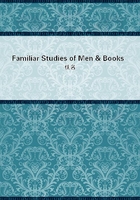
第67章
Sometimes, on the other hand, difficulties arise: rival verses come into a man's head, and fugitive words elude his memory. Then it is that he enjoys at the same time the deliberate pleasures of a connoisseur comparing wines, and the ardour of the chase. He may have been sitting all day long in prison with folded hands; but when he goes to bed, the retrospect will seem animated and eventful.
Besides confirming himself as an habitual maker of verses, Charles acquired some new opinions during his captivity. He was perpetually reminded of the change that had befallen him.
He found the climate of England cold and "prejudicial to the human frame;" he had a great contempt for English fruit and English beer; even the coal fires were unpleasing in his eyes. (1) He was rooted up from among his friends and customs and the places that had known him. And so in this strange land he began to learn the love of his own. Sad people all the world over are like to be moved when the wind is in some particular quarter. So Burns preferred when it was in the west, and blew to him from his mistress; so the girl in the ballade, looking south to Yarrow, thought it might carry a kiss betwixt her and her gallant; and so we find Charles singing of the "pleasant wind that comes from France." (2) One day, at "Dover-on-the-Sea," he looked across the straits, and saw the sandhills about Calais. And it happened to him, he tells us in a ballade, to remember his happiness over there in the past; and he was both sad and merry at the recollection, and could not have his fill of gazing on the shores of France. (3) Although guilty of unpatriotic acts, he had never been exactly unpatriotic in feeling. But his sojourn in England gave, for the time at least, some consistency to what had been a very weak and ineffectual prejudice. He must have been under the influence of more than usually solemn considerations, when he proceeded to turn Henry's puritanical homily after Agincourt into a ballade, and reproach France, and himself by implication, with pride, gluttony, idleness, unbridled covetousness, and sensuality. (4) For the moment, he must really have been thinking more of France than of Charles of Orleans.
(1) DEBATE BETWEEN THE HERALDS.
(2) Works (ed. d'Hericault), i. 43.
(3) IBID. 143.
(4) Works (ed. d'Hericault), i. 190.
And another lesson he learned. He who was only to be released in case of peace, begins to think upon the disadvantages of war. "Pray for peace," is his refrain: a strange enough subject for the ally of Bernard d'Armagnac.
(1) But this lesson was plain and practical; it had one side in particular that was specially attractive for Charles; and he did not hesitate to explain it in so many words.
"Everybody," he writes - I translate roughly - "everybody should be much inclined to peace, for everybody has a deal to gain by it." (2)
(1) IBID. 144.
(2) IBID. 158.
Charles made laudable endeavours to acquire English, and even learned to write a rondel in that tongue of quite average mediocrity. (1) He was for some time billeted on the unhappy Suffolk, who received fourteen shillings and fourpence a day for his expenses; and from the fact that Suffolk afterwards visited Charles in France while he was negotiating the marriage of Henry VI., as well as the terms of that nobleman's impeachment, we may believe there was some not unkindly intercourse between the prisoner and his gaoler: a fact of considerable interest when we remember that Suffolk's wife was the granddaughter of the poet Geoffrey Chaucer. (2)
Apart from this, and a mere catalogue of dates and places, only one thing seems evident in the story of Charles's captivity. It seems evident that, as these five-and-twenty years drew on, he became less and less resigned.
Circumstances were against the growth of such a feeling. One after another of his fellow-prisoners was ransomed and went home. More than once he was himself permitted to visit France; where he worked on abortive treaties and showed himself more eager for his own deliverance than for the profit of his native land. Resignation may follow after a reasonable time upon despair; but if a man is persecuted by a series of brief and irritating hopes, his mind no more attains to a settled frame of resolution, than his eye would grow familiar with a night of thunder and lightning. Years after, when he was speaking at the trial of that Duke of Alencon, who began life so hopefully as the boyish favourite of Joan of Arc, he sought to prove that captivity was a harder punishment than death. "For I have had experience myself," he said; "and in my prison of England, for the weariness, danger, and displeasure in which I then lay, I have many a time wished I had been slain at the battle where they took me." (3) This is a flourish, if you will, but it is something more. His spirit would sometimes rise up in a fine anger against the petty desires and contrarieties of life. He would compare his own condition with the quiet and dignified estate of the dead; and aspire to lie among his comrades on the field of Agincourt, as the Psalmist prayed to have the wings of a dove and dwell in the uttermost parts of the sea. But such high thoughts came to Charles only in a flash.
(1) M. Champollion-Figeac gives many in his editions of Charles's works, most (as I should think) of very doubtful authenticity, or worse.
(2) Rymer, x. 564. D'Hericault's MEMOIR, p. xli. Gairdner's PASTON LETTERS, i. 27, 99.
(3) Champollion-Figeac, 377.